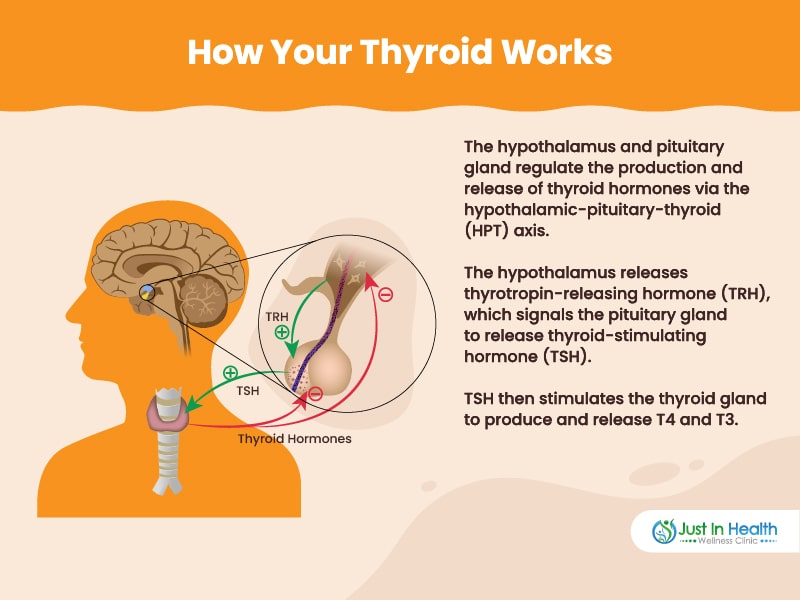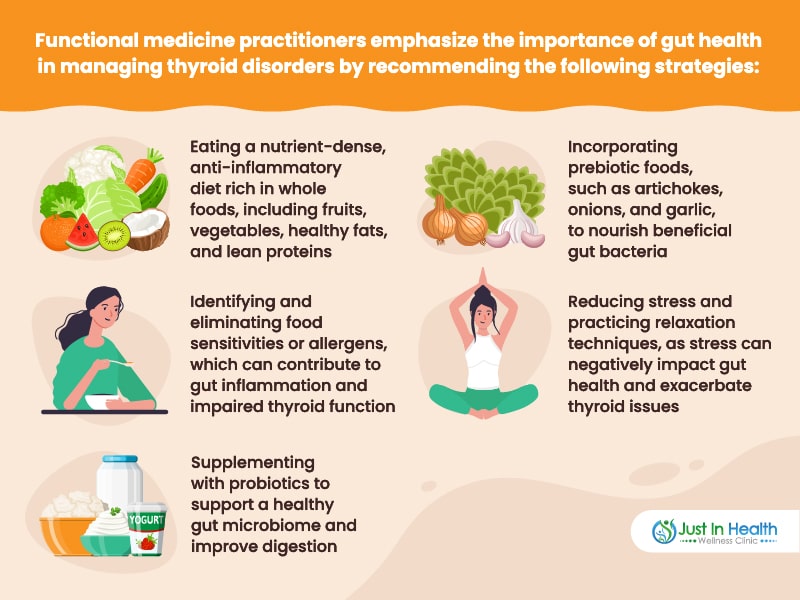
Functional medicine takes a root-cause approach to thyroid health, addressing the underlying factors contributing to hypothyroidism rather than just managing symptoms. This holistic method evaluates nutrition, gut health, stress levels, environmental toxins, and immune function to create personalized treatment plans.
This article explores how functional medicine approaches hypothyroidism, common causes, preventive strategies, and the connections between gluten, gut health, toxins, and infections that influence thyroid function.
The thyroid gland at the neck's base regulates metabolism, growth, and energy production. It produces two essential hormones:
The thyroid is controlled by the hypothalamic-pituitary-thyroid (HPT) axis:
When this system is disrupted, it can lead to hypothyroidism, slowing metabolism and causing a wide range of health issues.
If you need help supporting your thyroid health, schedule a call with Dr. J by clicking here.

Hypothyroidism occurs when the thyroid gland does not produce enough thyroid hormones, leading to fatigue, weight gain, depression, brain fog, and cold intolerance. Several factors contribute to hypothyroidism, including:
Understanding the root cause of thyroid dysfunction is essential for effective treatment.

Functional medicine takes a personalized approach to thyroid health by addressing underlying imbalances. Some key strategies include:
By addressing these factors, functional medicine aims to restore optimal thyroid function naturally.
While iodine is essential for thyroid hormone production, excessive iodine intake can worsen Hashimoto’s thyroiditis by triggering an autoimmune response.
High iodine levels can increase the production of thyroid peroxidase (TPO), an enzyme involved in thyroid hormone synthesis that is often a target of autoimmune attacks.
To maintain optimal iodine levels, functional medicine practitioners recommend:
A balanced approach to iodine intake is crucial to prevent worsening thyroid dysfunction.
There is a strong correlation between gluten sensitivity and Hashimoto’s thyroiditis, an autoimmune condition in which the immune system attacks the thyroid.
Gluten, a protein found in wheat, barley, and rye, can:
Many people with Hashimoto’s report symptom relief and improved thyroid function after adopting a gluten-free diet. Functional medicine often recommends eliminating gluten and grain-based foods to reduce inflammation and autoimmune activity.
Approximately 20% of T4 is converted into active T3 in the gut, making gut health a critical factor in thyroid function.
An unhealthy gut can:
To support gut health and thyroid function, functional medicine practitioners recommend:
Healing the gut is a key strategy for optimizing thyroid function and preventing autoimmune flare-ups.
If you need help supporting your thyroid health, schedule a call with Dr. J by clicking here.
Everyday exposure to toxins and endocrine disruptors can interfere with thyroid hormone production. Chemicals like BPA, phthalates, and heavy metals can:
To minimize exposure, functional medicine practitioners recommend:
Reducing toxin exposure supports thyroid balance and hormone regulation.
Chronic infections, such as Epstein-Barr virus (EBV), Lyme disease, and bacterial overgrowth, have been linked to autoimmune thyroid conditions.
These infections can:
Functional medicine practitioners identify and treat infections through comprehensive testing, targeted therapies, and immune-supportive strategies.
Functional medicine provides a holistic and personalized approach to hypothyroidism, focusing on root causes rather than symptom management. By addressing factors such as gluten sensitivity, gut health, toxin exposure, infections, and nutrient deficiencies, functional medicine helps patients restore thyroid balance and improve overall health.
Individuals can take proactive steps to prevent and reverse thyroid disease naturally through dietary changes, stress management, targeted supplementation, and lifestyle adjustments.
Can hypothyroidism be reversed naturally?
Yes, in many cases. Addressing gut health, reducing inflammation, and correcting nutrient deficiencies can significantly improve thyroid function.
Is a gluten-free diet necessary for thyroid health?
Many individuals with Hashimoto’s benefit from eliminating gluten, as it can trigger autoimmune reactions.
Does stress affect thyroid function?
Yes, chronic stress impacts adrenal function, increases inflammation and worsens thyroid imbalances.
What nutrients are essential for thyroid health?
Iodine, selenium, zinc, and vitamin D are vital for thyroid hormone production and immune regulation.
Product Links:
Link: https://www.ncbi.nlm.nih.gov/pmc/articles/PMC6474245/
Link: https://www.ncbi.nlm.nih.gov/pmc/articles/PMC5470886/
Link: https://www.ncbi.nlm.nih.gov/pmc/articles/PMC3295365/
Link: https://www.ncbi.nlm.nih.gov/pmc/articles/PMC6893534/